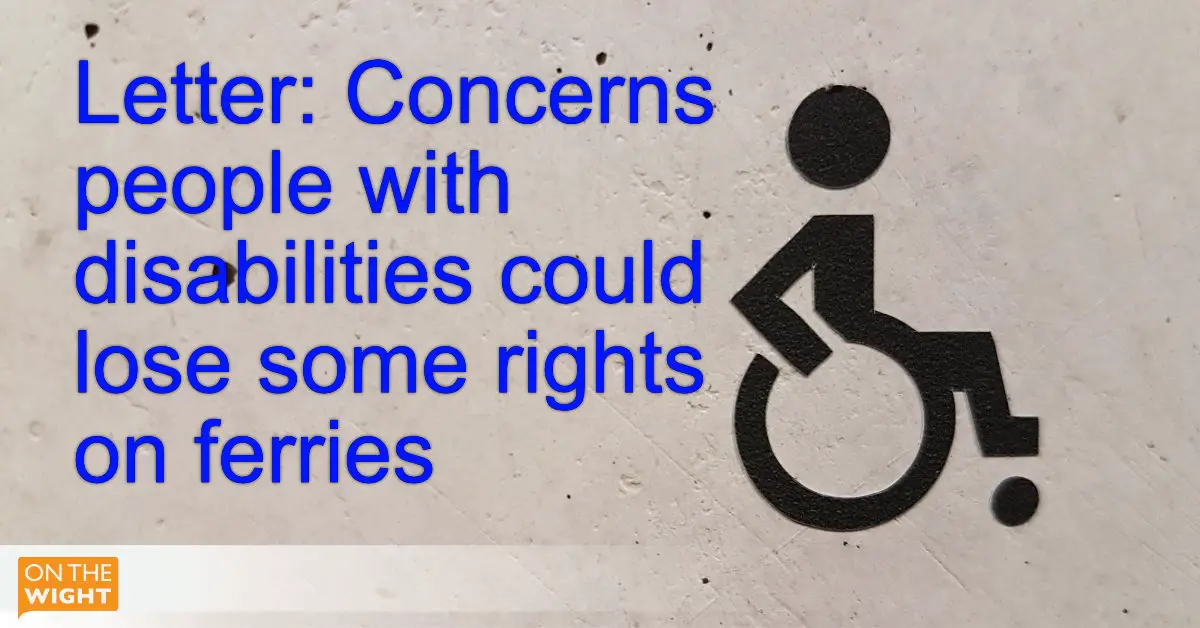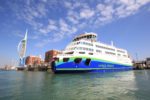OnTheWight always welcomes a Letter to the Editor to share with our readers – unsurprisingly they don’t always reflect the views of this publication. If you have something you’d like to share, get in touch and of course, your considered comments are welcome below.
This from Matthew Smith of Cowes shares this letter to Bob Seely, who told him has now been forwarded onto the Transport Secretary. Ed
I am a retired marine engineering lecturer living on the Isle of Wight and have noticed that the ‘The Merchant Shipping (Passengers’ Rights) (Amendment etc.) (EU Exit) Regulations 2019’ Government, ‘Guidance for carriers, tour operators and travel agents on the carriage of disabled passengers and others with reduced mobility’ has changed from the disabled rights regulation EU1177 ‘Rights of passengers when travelling by sea and inland waterway’ beyond all recognition.
The new guidance removes all disabled rights from be accepted on a ferry if the ships master deems that the disabled person is, unsafe to board or transport.
The EU1177 does make provision in exceptional circumstances for the ferry operators right to refuse boarding when such boarding would breach’; (a) safety requirements established by international, Union or national law or in order to meet safety requirements established by the competent authorities; (b) where the design of the passenger ship or port infrastructure and equipment, including port terminals, makes it impossible to carry out the embarkation, disembarkation or carriage of the said person in a safe or operationally feasible manner. ‘
Requirements not listed in new Government guidance
However, in these rare circumstances, the EU1177 states, ‘ferry operators, shall make all reasonable efforts to propose to the person concerned an acceptable alternative transport on a passenger service or a cruise operated by the carrier or the right to reimbursement and re-routing’.
These requirements are not listed in the new Government guidance.
Discriminating those needing to remain in vehicles
The greatest failing of the guidance, is to list circumstances in which disabled travellers can be refused boarding, without considering any reasonable adjustment.
This will directly discriminate against, those passengers that need to remain in the vehicle due to increased risk of infection or poor mobility, those that require large wheelchairs and are unable to transfer to a smaller chair, those that use oxygen cylinders and those that need assistance on ramps.
Ferry passage not guaranteed
These passengers are unable to guarantee ferry passage, even if they let the operator know of their requirements 48 hours or even a month in advance, the decision to allow the disabled person passage is with the ships master alone.
This breaches the disabled persons rights for ‘non-discrimination and assistance for disabled persons and persons with reduced mobility’ contained within EU1177.
What is needed
On booking 48 hours in advance and once the disabled person has explained their needs and NOT their disability to the operator, the operator should be able to negotiate with the disabled person the most appropriate time of sailing to meet both safety requirements and the disabled person’s needs.
For example:
- In the case of being allowed to remain in the vehicle, departures should be offered without hazardous goods and away from trailers.
- In the case of assistance on ramps, offer sailings when tides reduce the boarding ramps incline and when appropriate assistance would be available.
- In the case for those requiring oxygen, offer sailings where areas free from ignition sources or smoking can be offered.
- In the case of those using large wheelchairs, allow the disabled person the option to remain in the vehicle.
In my experience disabled people do not need complex designed engineered solutions, just a little consideration and the ability to book a ferry with the certainty of being able to travel with able bodied passengers.
The introduction of these new regulations without first completing and equalities impact assessment is in my view unlawful and an example of Ultra Vires in public office.
Following the letter being sent, Isle Access have shared reassurances they received from the ferry companies. Ed
Image: marianne bos Image: Nubia Navarro under CC BY 2.0





